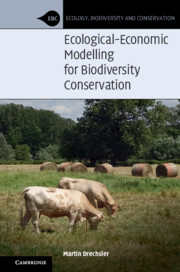Book contents
- Ecological-Economic Modelling for Biodiversity Conservation
- Ecology, Biodiversity and Conservation
- Ecological-Economic Modelling for Biodiversity Conservation
- Copyright page
- Contents
- Preface
- Acknowledgements
- Part I Modelling
- Part II Ecological Modelling
- Part III Economic Modelling
- 9 Instruments for Biodiversity Conservation
- 10 Game Theory
- 11 Incentive Design
- 12 Modelling Human Decisions
- 13 The Agglomeration Bonus
- Part IV Ecological-Economic Modelling
- References
- Index
10 - Game Theory
from Part III - Economic Modelling
Published online by Cambridge University Press: 29 February 2020
- Ecological-Economic Modelling for Biodiversity Conservation
- Ecology, Biodiversity and Conservation
- Ecological-Economic Modelling for Biodiversity Conservation
- Copyright page
- Contents
- Preface
- Acknowledgements
- Part I Modelling
- Part II Ecological Modelling
- Part III Economic Modelling
- 9 Instruments for Biodiversity Conservation
- 10 Game Theory
- 11 Incentive Design
- 12 Modelling Human Decisions
- 13 The Agglomeration Bonus
- Part IV Ecological-Economic Modelling
- References
- Index
Summary
A foundation of the economic analysis of policy instruments and human behaviour is game theory. The present chapter presents some basics of game theory in a nutshell. The first section formulates the social dilemma described in Chapter 9 in the language of game theory, introducing in particular the prisoner’s dilemma. The following section defines the concept of Nash equilibrium and argues that players in the prisoner’s dilemma are trapped in an unfavourable Nash equilibrium. Two other popular games relevant in the context of biodiversity conservation are presented: the coordination game and the chicken game. The final section of the chapter outlines evolutionary game theory which analyses the evolution of behaviour. Of particular interest within the context of social and prisoner’s dilemmas is the evolution and stability of cooperation among agents.
- Type
- Chapter
- Information
- Ecological-Economic Modelling for Biodiversity Conservation , pp. 128 - 137Publisher: Cambridge University PressPrint publication year: 2020

